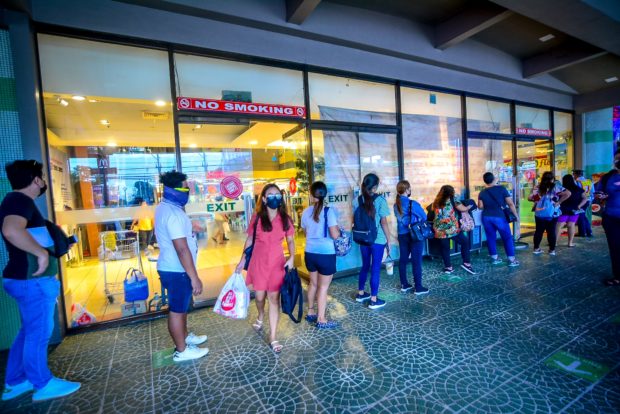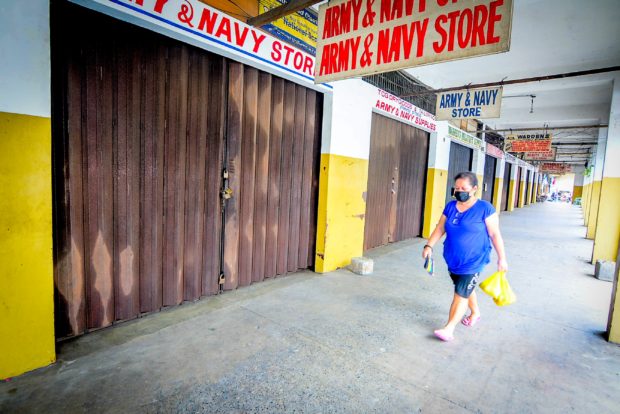No border restrictions in Iloilo despite strict quarantine

STORING FOOD Residents flock to a supermarket in Iloilo City on July 16 to buy food and grocery items following the escalation of the quarantine classification of the city from modified enhanced community quarantine (MECQ) to enhanced community quarantine (ECQ). —PHOTO COURTESY OF IAN PAUL CORDERO
ILOILO CITY, Iloilo, Philippines — Unlike the stringent measures imposed when the city and province of Iloilo were placed on enhanced community quarantine (ECQ) at the start of the COVID-19 pandemic in March last year, rules this time are more lenient.
The Iloilo City government has allowed the full operation of public transport but only up to 50 percent of the vehicles’ passenger capacity.
No border controls have been imposed in the province and quarantine passes are no longer required in both the province and city.
Only the public consumption of alcohol is prohibited. In Iloilo City, sale of alcoholic beverages is allowed from 8 a.m. to 6 p.m.
But other restrictions remain.
Article continues after this advertisementA curfew from 9 p.m. to 4 a.m. has been imposed until July 31 while the city remains on ECQ, except for those required to work in permitted establishments or offices, Mayor Jerry Treñas said.
Article continues after this advertisementMovement of most residents is limited to accessing goods and services from establishments allowed to operate, like hospitals, pharmacies, public markets and supermarkets, among others.
The mayor said they were trying their best to allow economic activities to help the city recover while dealing with ECQ restrictions.
“I know this is a very hard time for most of us … I am also requesting everyone to support businesses in the city so they can also sustain their families. We are hoping that we will also be assisted by the national government during this time,” he said in a Facebook post on Saturday.
Jobs threatened
Treñas earlier called “unjustified and unfair” the elevation of the city’s quarantine status to the strictest level despite appeals of the local government and business owners.
He raised concern that many of the city’s 500,000 residents and those working here would go hungry because of mandatory restrictions.
Many Ilonggos also decried the decision of the Inter-Agency Task Force for the Management of Emerging Infectious Diseases (IATF) to put the province and city of Iloilo under ECQ from July 16 to July 31.
President Duterte on July 15 approved a modified enhanced community quarantine status for both the city and province of Iloilo but less than 24 hours later, the IATF elevated the status to ECQ.

TO STAY CLOSED Nonessential stores and other establishments in Iloilo City that were shut down after the city was placed under MECQ in June due to a surge in COVID-19 cases will remain closed now that the city is under ECQ until July 31. —PHOTO COURTESY OF IAN PAUL CORDERO
Treñas questioned the main basis of the ECQ status, which was the detection of persons infected with the COVID-19 Delta variant in May in Antique province, which is 180 kilometers away and about a six-hour travel by land from Iloilo City.
Bagong Alyansang Makabayan (Bayan) in Panay also deplored the ECQ status of Iloilo.
Cases dropping
Bayan-Panay deputy spokesperson Bryan Bosque said the lockdowns and restrictions in Iloilo were “useless” because the national government had failed to address the root cause of the recurring surge in COVID-19 cases.
“Failing to address the health crisis, lockdowns only worsen problems of poverty, hunger and unemployment by not giving people adequate subsidy during the times of the lockdown,” Bosque said.According to Treñas, the number of COVID-19 cases in the city went down by about 20 between June and July.
He also pointed out that 60 percent of patients confined in 10 hospitals in the city are from the provinces of Antique, Aklan, Capiz, Guimaras and Iloilo.
Referring to the bed capacity of hospitals, the mayor said “it is within the power and the funds of [the Department of Health] to hire health personnel to augment the private and public hospitals in Iloilo City so that we can accommodate more patients from Panay and Guimaras.”
“The city will try to do its best to give out food assistance in the meantime. Let’s help each other during these times. Now is the time for us to be united,” Treñas said.